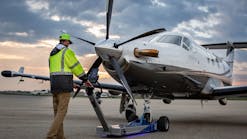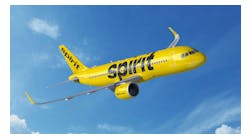For some 20 years the refueling industry has been using water-absorbing filter elements in filter monitors to remove potentially harmful contaminants when delivering jet fuel into aircraft. However, last year, the American Petroleum Institute (API), which sets standards for such equipment, pulled its API-1583 standard which governs filter elements; and, on October 26, the Energy Institute - Europe's equivalent of API - issued a "warning" related to the monitors. As a result, fuel suppliers are putting on an information blitz to refueling companies - "thou shalt not use" these elements on pretreated (anti-icing additive treated) fuel, is how one industry rep puts it. But the use of monitor filters even in non-treated fuel is in question.
Besides the obvious safety implications, say industry sources, the issue has liability written all over it. As one representative explains, "The Energy Institute and API set the standards, and attorneys are good at focusing in on industry standards which they then view as law."
According to sources, the U.S. Air Force has stopped using monitor elements and the U.S. Navy has now followed suit. Both use pre-treated fuel. Explains Jim Gammon, president of Gammon Technical Products, Inc., "There is very real confusion over water-absorbing filter elements." He says that while many agree it is wrong to use these elements in fuel with anti-icing additive, there is a question in regard to their safe use in plain jet- A fuel. "This is because not only may these elements pass water in some cases, but they also may release trace amounts of water-absorbing media."
It was these concerns, explains Gammon, that led to API dropping the API-1583 standard. However, the Energy Institute continued to support the standard. EI's warning in October served to heighten the concern. As one industry supplier put it, "This was the first time that API or EI has publicly released such a statement."
Industry officials are hopeful much of this will be cleared up at the annual Aviation Fuel Forum being hosted in November in Kuala Lumpur by the International Air Transport Association.
Meanwhile, fixed base operators and other aviation refueling companies are being advise to use extra diligence in their refueling operations. Advises Gammon, "Sump all drain points in the fuel system regularly to reduce the possibility of water buildup, whether you have additive or not, and to reduce the possibility of biological growth problems in systems without additive.
"Do not use water-absorbing filters in fuel with [anti-icing] additive in it. You must use a filter separator. You cannot retrofit a filter vessel made for water-absorbing elements to accept filter separator elements. "In addition, a filter separator vessel is much larger. Work is being done to try to come up with smaller vessels for this than are presently available, but they will still be larger than monitor vessels. If you have a filter separator on your truck, and it was retrofitted with water-absorbing elements, you can change it back. But you must have a water detector in the sump.
"But going from pre-treated fuel to plain jet fuel and additive injectors is not simple. You must keep the reservoirs full, turn the injectors on and off, and do simple maintenance (most importantly, changing the desiccant dryer, and calibration)."




